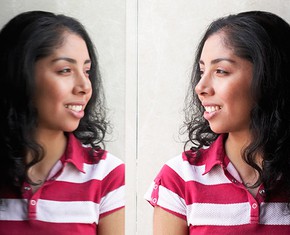The views expressed in our content reflect individual perspectives and do not represent the authoritative views of the Baha'i Faith.
Every marriage involves the union of two families, and not merely the formation of a new and separate household.
You’ve undoubtedly heard that old saying: “You don’t just marry a person—you marry the whole family.”
Why is this true? Well, in succeeding years the newly-married couple will likely choose to start a family, which inevitably involves the grandparents, the uncles and aunts, the cousins, and so on. Building unity at the outset of a marriage provides a strong foundation for the relationship and ensures a smooth transition into the more complex elements of married life.
If the bond of marriage is to last, the seeds of love and unity must exist and must be cultivated. Love and unity transcend this life; they are spiritual qualities that we take with us on our eternal voyage. For this reason, before entering into the covenant of marriage, each partner must become fully acquainted with the character of his or her potential spouse. The Baha’i teachings give guidance about the process of getting to know a potential spouse:
Marriage is the commitment of the two parties one to the other, and their mutual attachment of mind and heart. Each must, however, exercise the utmost care to become thoroughly acquainted with the character of the other, that the binding covenant between them may be a tie that will endure forever. Their purpose must be this: to become loving companions and comrades and at one with each other for time and eternity.
The true marriage of Baha’is is this, that husband and wife should be united both physically and spiritually, that they may ever improve the spiritual life of each other, and may enjoy everlasting unity throughout all the worlds of God. This is Bahá’í marriage. – Abdu’l-Baha, Selections from the Writings of Abdu’l-Baha, p. 118.
This kind of spiritual love is not romance, nor is it passion, though it can include both at times. Some people associate love with affection, sentiment, infatuation, devotion, rapture, ecstasy, and more. The fact that there are so many different words associated with the concept of love reveals that it is something more than the imagination can hold. Love is like electricity: It is familiar to everyone, but no one knows its true nature. Love is not merely one thing or another. It is inherent in all things, and it is that quality which holds things together:
Deal ye one with another with the utmost love and harmony, with friendliness and fellowship … So powerful is the light of unity that it can illuminate the whole earth. – Baha’u’llah, Gleanings from the Writings of Baha’u’llah, p. 288.
Truly, the Lord loveth union and harmony and abhorreth separation and divorce. Live ye one with another, O people, in radiance and joy. – Baha’u’llah, The Most Holy Book, p. 44.
In many Western cultures, we often associate marriage with the romantic notion of love. We may believe in something called a “soul mate” and dream of finding that one special individual in all of the world who is right for us. This notion is a relatively recent Western invention that has been popularized in the past few centuries. Though it is wonderful on occasions like Valentine’s Day and wedding anniversaries, the romantic notion of love is not a realistic foundation for a marriage—at least not by itself.
If we attempt to make romance the basis of our marriage, we are bound to be disappointed, for no long-term satisfaction can come from a romantic fantasy. Romantic love is like the sudden burst of light that flares up when you light a candle; yet the candle’s longevity and usefulness depend on its ability to burn strongly, slowly, and consistently.
In marriage, the Baha’i teachings say, it is better to base our expectations on the qualities of a person’s character. Liking and respecting the person whom we are actually with will provide the greatest measure of satisfaction, as will liking who we are when we are with that person. When we base our love on the true inner qualities of character, our love becomes unlimited in its scope:
Love is unlimited, boundless, infinite! Material things are limited, circumscribed, finite. You cannot adequately express infinite love by limited means. – Abdu’l-Baha, Paris Talks, p. 36.
Loving the soul and the character of our mate and being comforted by our mutual loving-kindness create enduring foundations for a permanent marital relationship. They bring out the sacred qualities that lie hidden deep within us. In one Baha’i prayer for marriage, Abdu’l-Baha provided a powerful analogy: “O Thou kind Lord! Make Thou this marriage to bring forth coral and pearls.” – Baha’i Prayers, p. 106.
The analogy here is profound: precious and organic things, like coral and pearls, take time to grow. They build living layers over time, slowly, deliberately and solidly forming a beautiful creation. In the same way, the most important results of a marriage can take a long time to develop. Over time, our lives and personal capacities are enhanced by our union as we learn to communicate, inspire, and be sensitive to each other’s spiritual needs. When that happens, our union can create a family:
… the importance of marriage lieth in the bringing up of a richly blessed family, so that with entire gladness they may, even as candles, illuminate the world. For the enlightenment of the world dependeth upon the existence of man. If man did not exist in this world, it would have been like a tree without fruit. – Abdu’l-Baha, Selections from the Writings of Abdu’l-Baha, p. 120.
According to Baha’i belief, one of the most important purposes of marriage is to raise a family. There is probably no greater expression of the union between two individuals than raising children together. Many couples experience a deepening love for each other as they share the joys, challenges, and responsibilities of child rearing. Unfortunately, when the foundation of the marriage is weak, child rearing and the stresses that it creates can contribute to disunity and strife. Communication, consultation, a commitment to each other, and a shared sense of purpose are essential to working through those difficult times.
Marriage gives us opportunities to expand our ability to communicate and consult effectively. We learn to listen deeply to our partner, not so much for the purpose of agreeing or disagreeing, but because we want to show our love and respect for that person—and we want to know our partner. By sharing our lives in this way, we learn that communication is not about who speaks the loudest, longest, or most often. It often involves not speaking at all, but rather listening to each other attentively. We find that we can consult in a frank and loving manner as we discuss what lies ahead, and together choose the kind of future we want to have. In marriage we learn that compromise—where one or the other party or both get less than the full measure of what they want—need not be the rule. We discover that most often there is agreement and consensus on how to proceed.
In a spiritual marriage, we find that we develop the capacity to inspire and to be inspired by each other’s thoughts and ideas. When we are invested in helping each other we ensure that we grow spiritually in ways that we cannot foresee. We have that “true” relationship that goes beyond the temporary sensations of passion or romance. We have something that is lasting and fulfilling, something that will carry us through eternity. When we look upon the face of our beloved, we see the friend who knows us best, our chosen life’s companion, the spiritual partner whose needs we care for as much as our own. When we pray, we remember our love and ask for God’s blessings and assistance:
O my Lord, O my Lord! These two bright orbs are wedded in Thy love, conjoined in servitude to Thy Holy Threshold, united in ministering to Thy Cause. Make Thou this marriage to be as threading lights of Thine abounding grace, O my Lord, the All-Merciful, and luminous rays of Thy bestowals, O Thou the Beneficent, the Ever-Giving, that there may branch out from this great tree boughs that will grow green and flourishing through the gifts that rain down from Thy clouds of grace.
Verily, Thou art the Generous. Verily, Thou art the Almighty. Verily, Thou art the Compassionate, the All-Merciful. – Abdu’l-Baha, Baha’i Prayers, pp. 107-108.
















Comments
Sign in or create an account
Continue with Googleor